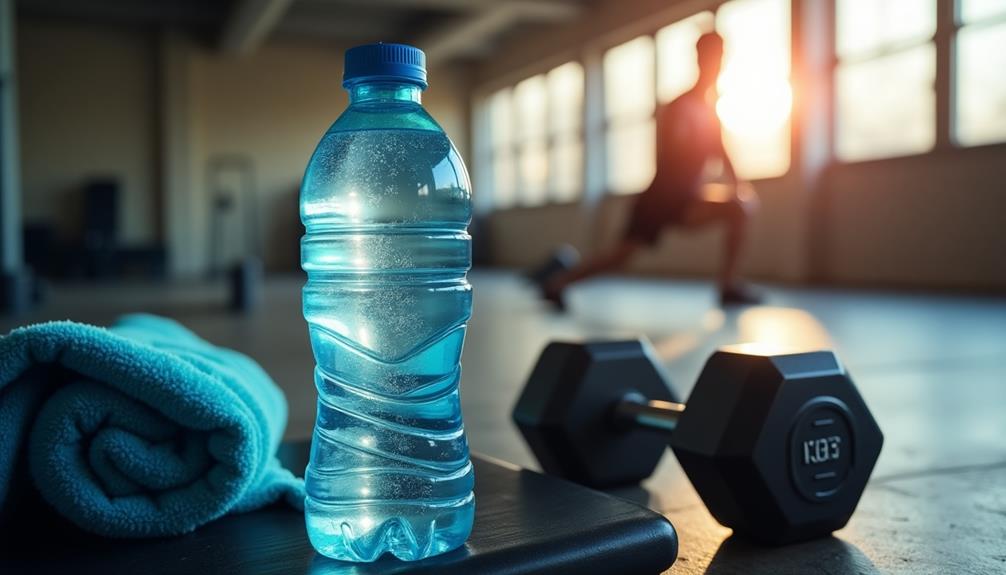To reduce post-resistance training fatigue, start with proper hydration and nutrient timing. Drink water before, during, and after your workouts, and incorporate protein and carbs soon after exercising. Engage in active recovery with low-intensity activities like walking or yoga to promote blood flow. Prioritize quality sleep, aiming for 7-9 hours each night, and manage stress through relaxation techniques. Incorporate warm-ups and cool-downs in your routine, adjust workout intensity as needed, and listen to your body's signals. Lastly, consider appropriate supplements to support recovery. Implement these strategies, and you'll discover more tips to enhance your performance.
Core Insights
- Stay hydrated by drinking water before, during, and after workouts to minimize fatigue and enhance recovery.
- Incorporate active recovery activities like walking and yoga to promote blood flow and muscle repair post-training.
- Consume a balanced post-workout meal with protein and carbs within 30 minutes to kickstart recovery and replenish glycogen.
- Aim for 7-9 hours of quality sleep each night to support muscle recovery and regulate stress hormones.
- Manage stress through techniques like meditation and deep breathing to optimize recovery and reduce cortisol levels.
Prioritize Proper Hydration

Proper hydration is essential for minimizing post-resistance training fatigue. When you work out, your body loses water through sweat, which can lead to dehydration. This dehydration can cause fatigue, decreased performance, and longer recovery times. To stay properly hydrated, aim to drink water before, during, and after your workouts. Consider incorporating hydration powders into your routine for enhanced electrolyte replenishment and peak performance during intense training sessions.
Start your workout well-hydrated by drinking at least 16-20 ounces of water two hours prior. During your session, sip water regularly, especially if you're exercising for more than an hour. After your workout, replenish lost fluids by consuming at least 16-24 ounces of water.
Focus on Nutrient Timing

Hydration lays the groundwork for your performance, but nutrient timing plays a significant role in how your body recovers post-resistance training. Understanding when to fuel your body can make a difference in reducing fatigue and enhancing recovery. Incorporating HMB supplements can further support muscle recovery and reduce post-workout fatigue. Proper timing and dosage of HMB can complement your nutrient intake strategy for best results.
- Consume protein within 30 minutes post-workout to kickstart muscle repair.
- Pair carbohydrates with protein to replenish glycogen stores.
- Stay mindful of your pre-workout meal, ensuring it's rich in carbs and moderate in protein.
- Consider smaller, frequent meals throughout the day to maintain energy levels.
Incorporate Active Recovery

Incorporating active recovery into your routine can greatly help reduce post-resistance training fatigue. Active recovery involves low-intensity exercises that promote blood flow and muscle repair without overexerting yourself. Think of it as giving your body a gentle nudge towards recovery. Here are some effective options:
| Activity | Duration |
|---|---|
| Walking | 20-30 minutes |
| Yoga | 30-60 minutes |
| Swimming | 20-30 minutes |
| Cycling (light) | 30-45 minutes |
| Foam Rolling | 10-15 minutes |
Get Adequate Sleep

Consider these important points about sleep:
- It enhances muscle recovery and growth.
- Sleep helps regulate hormones related to stress and appetite.
- A consistent sleep schedule improves sleep quality.
- Aim for 7-9 hours of sleep per night for best recovery.
Quality sleep is essential for post-exercise recovery, impacting muscle repair, immune function, and energy levels. Using sleep aids like melatonin supplements or herbal teas can support natural sleep cycles and improve overall rest.
Manage Stress Levels

Managing stress levels is vital for optimizing your post-resistance training recovery. High stress can impede your body's ability to recover, leading to increased fatigue. To keep stress in check, start by identifying your stressors. Once you know what's bothering you, you can address them directly. Consider incorporating relaxation techniques like deep breathing, meditation, or yoga into your routine. These practices can help lower cortisol levels and promote recovery. Additionally, make time for hobbies and social interactions, as they can provide a much-needed mental break. Prioritizing self-care is essential. Remember that a balanced approach to training and recovery includes managing your mental health. By keeping stress levels low, you'll set yourself up for more effective workouts and better recovery.
Utilize Foam Rolling

Foam rolling is an effective tool for reducing post-resistance training fatigue and enhancing recovery. By incorporating foam rolling into your routine, you can alleviate soreness and improve muscle function. Here's why you should give it a try:
- Increases blood flow to your muscles, promoting healing.
- Reduces muscle soreness and tightness after workouts.
- Improves flexibility and range of motion for better performance.
- Helps prevent injuries by addressing muscle imbalances.
To get started, choose a foam roller that suits your needs. Focus on major muscle groups, rolling slowly and applying pressure to tight areas. Spend about 1-2 minutes on each muscle group, and remember to breathe deeply. This simple practice can make a significant difference in how you feel after your workouts.
Warm Up and Cool Down

A proper warm-up and cool-down routine is essential for minimizing post-resistance training fatigue. Start with a dynamic warm-up, which prepares your muscles and joints for the workout ahead. Incorporate movements like arm circles, leg swings, and light jogging to increase blood flow and flexibility. Aim for about 5 to 10 minutes of this activity.
After your workout, don't skip the cool-down. Spend another 5 to 10 minutes engaging in low-intensity exercises and static stretches. This helps your heart rate gradually return to normal and reduces muscle stiffness. Focus on stretching all major muscle groups, holding each stretch for at least 20 seconds. By incorporating these routines, you'll enhance recovery and feel better prepared for your next session.
Adjust Your Workout Intensity

While pushing your limits can be beneficial for strength gains, adjusting your workout intensity is important for minimizing post-resistance training fatigue. By finding the right balance, you can still challenge yourself without overdoing it. Here are some tips to help you adjust your intensity effectively:
- Incorporate lighter days: Alternate between heavy and light workout sessions to allow your body to recover.
- Focus on form: Prioritize proper technique over lifting heavier weights to prevent unnecessary strain.
- Use a rep range: Vary your repetitions to keep your muscles engaged while managing fatigue levels.
- Include rest periods: Schedule rest intervals between sets to allow your body to recuperate and maintain performance.
Listen to Your Body

Listening to your body is vital for optimizing your resistance training and minimizing fatigue. Pay attention to how you feel during and after your workouts. If you notice unusual pain or excessive tiredness, it's a sign to adjust your routine. Don't ignore these signals; they're your body's way of communicating its needs.
Consider incorporating rest days when you feel fatigued. It's important to allow your muscles to recover. Additionally, monitor your energy levels throughout the week. If you're consistently drained, you might need to lower the intensity of your workouts or increase your recovery time.
Consider Supplements Wisely

Informed choices about supplements can significantly enhance your resistance training experience and help alleviate post-workout fatigue. When considering supplements, focusing on quality and evidence-based options is crucial. Here are some that may assist you:
- Protein powders: Support muscle recovery and growth.
- Branched-chain amino acids (BCAAs): Help reduce muscle soreness and fatigue.
- Creatine: Boost energy levels and improve performance.
- Electrolytes: Aid in hydration and prevent cramping.
Before incorporating any supplement into your routine, consult with a healthcare professional. They can help you determine the most suitable options for your individual needs. Always keep in mind that supplements should complement a balanced diet, not replace it. Prioritizing whole foods is the cornerstone of effective training and recovery.
Frequently Asked Questions
How Does Age Affect Post-Resistance Training Fatigue Recovery?
Age impacts your recovery by slowing muscle repair and reducing hormone levels. As you age, you might notice longer recovery times after resistance training, making it essential to adapt your routine and listen to your body.
Can Mental Health Impact Physical Recovery After Workouts?
Imagine your mind as a garden; when it's healthy, vibrant blooms thrive. If you're stressed or anxious, weeds choke recovery. Mental health directly impacts your physical recovery, so nurturing your mind is essential for overall wellness.
What Are the Signs of Overtraining to Watch For?
You should watch for signs like persistent fatigue, decreased performance, irritability, sleep disturbances, and increased injury risk. If you notice these symptoms, it's essential to reassess your training intensity and allow for adequate recovery.
Does Resistance Training Frequency Influence Fatigue Levels?
Yes, resistance training frequency does influence fatigue levels. If you train too often without adequate recovery, you'll likely experience increased fatigue. Balancing your workout routine is essential to managing energy and promoting better performance.
Are There Specific Foods to Avoid Post-Workout for Better Recovery?
Think of your body as a racecar; what you fuel it with matters. After a workout, avoid sugary snacks and heavy fats. Instead, choose lean proteins and complex carbs for the best recovery and performance boost.

